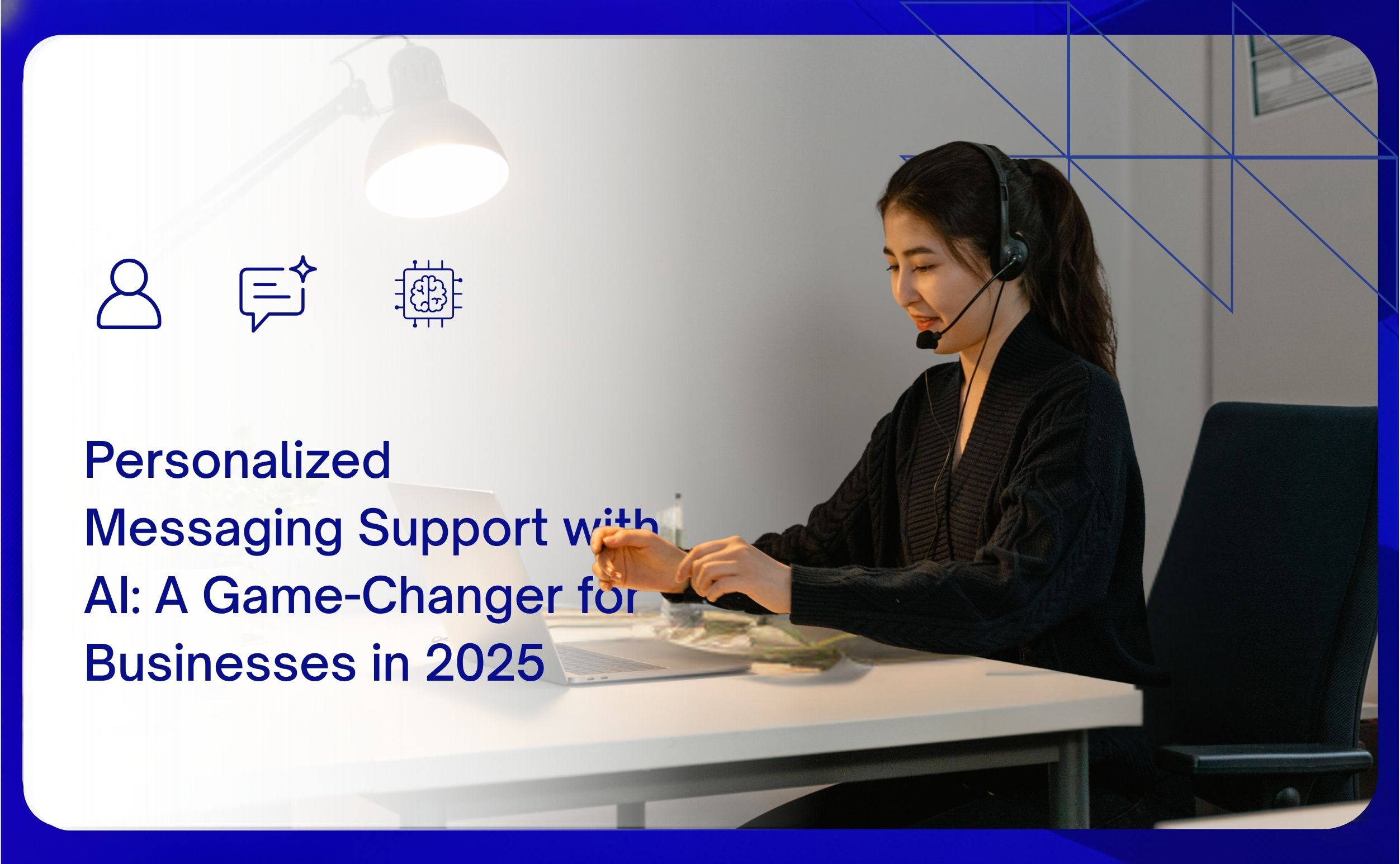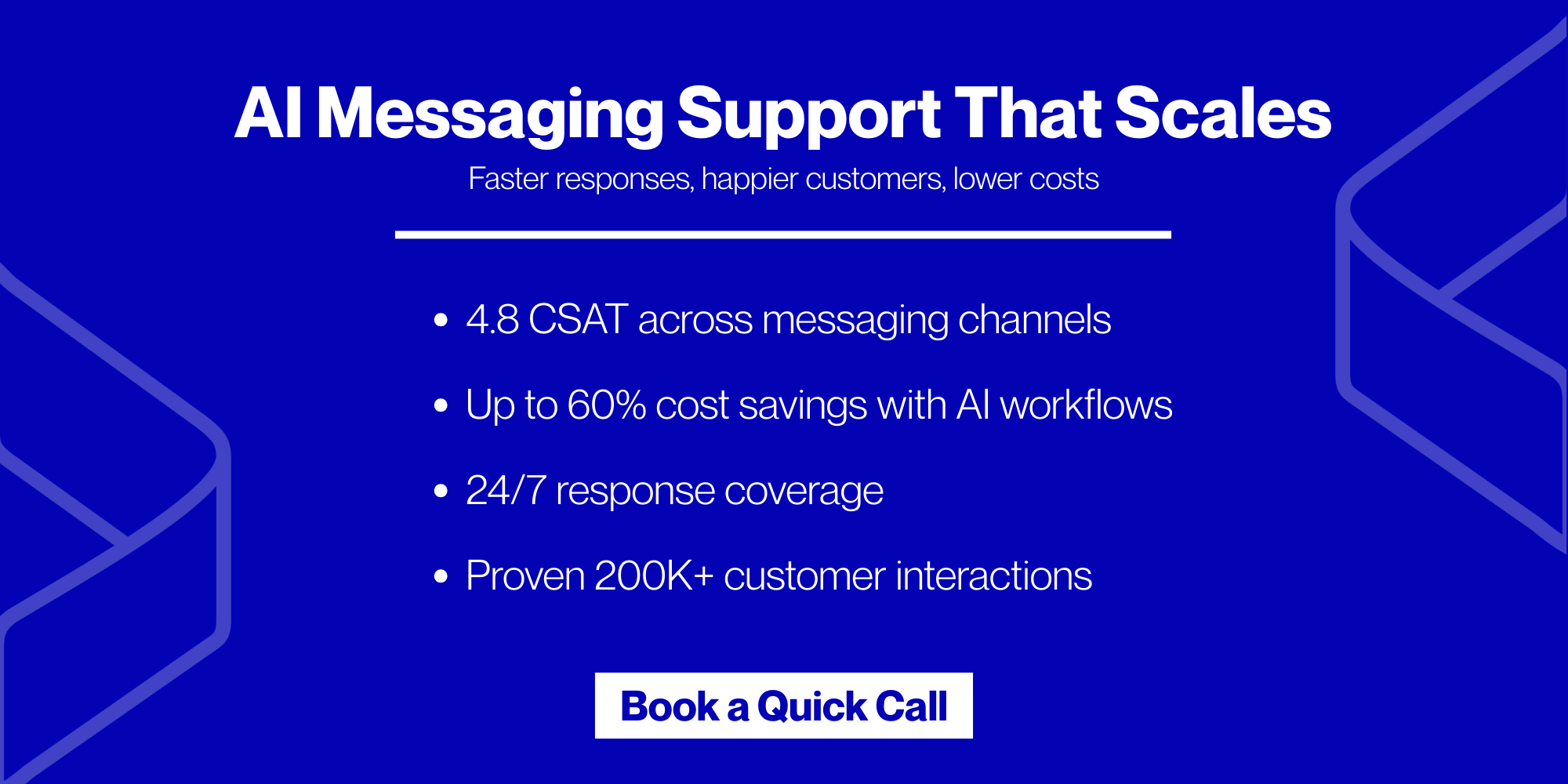Table of Contents
- Introduction
- What is AI personalization?
- How does AI personalization work?
- What are the key features of the Personalized Messaging Support with AI ?
- What are the benefits of personalized messaging support with AI?
- Positive Customer Experiences
- Increased Engagements and Conversion Rates
- Cost Effectiveness
- Competitive Edge
- Data Driven Decisions
- Targeted Segmentation
- Sentiment Analysis
- What are the emerging trends in personalized messaging support with AI?
- Hyper Personalization
- Omnichannel Personalization
- Generative AI for Content Creation
- What are the limitations and boundaries of AI personalized messages?
- Final Thoughts
- Frequently asked questions
Introduction
When it comes to business, dealing with customers is one of the biggest tasks. Customers always prefer to have a personalized approach while dealing with them. Customer communication has evolved beyond merely sending messages. It now focuses on crafting experiences that captivate individuals and enhance business outcomes. The recent game-changer that is revolutionizing the business is artificial intelligence. Industries are progressively adopting AI-driven personalization to examine extensive datasets and enhance decision-making.
Through this blog, we will walk you through AI personalization and how AI is transforming the business in 2025.
What is AI personalization?
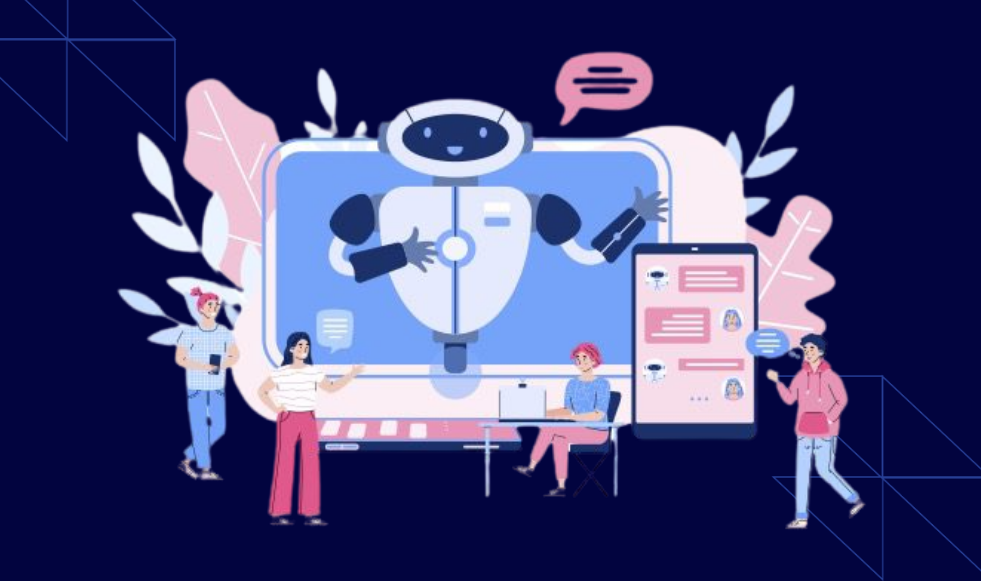
Artificial Intelligence (AI) personalization utilizes customer data and interaction history to tailor personalized experiences that resonate with individual customers. By possessing in-depth knowledge of user behavior, AI-driven tools can generate highly tailored interactions that enhance customer experiences and increase customer engagement.
With the recent advancements in AI, businesses offer a more personalized service to customers, which includes AI-driven recommendations, omnichannel hyper-personalization. Recent studies have shown that three out of five customers are likely to use AI as they shop. 71% of the customers expect a more personalized approach. It is also found that businesses that prefer AI personalization have 40% more profit than their conventional counterparts.
In today’s business world, artificial intelligence is used for the creation of AI-driven recommendations and contextually appropriate experiences at scale.
How does AI personalization work?

Do you understand how the AI personalization is done? It generally depends on a mix of machine learning (ML), natural language processing (NLP), and generative AI. The process usually involves collecting data on customers with respect to user behavior, preferences, and interactions, and combining it with contextual details like location, time of day, and device used. Frequently, this data compilation involves merging internal organizational data with external dataset sources. This information is then processed by artificial intelligence algorithms to identify patterns and trends in user activity. In the majority of instances, the AI will segment users into groups according to common traits and behaviors, known as audience segmentation. Through evaluating these segments and user activities, the AI will proceed to suggest products, services, or content according to the user’s interests and demographics. The AI can also display tailored content on an app or website, depending on the individual data profile for various users.
| Process | How does AI personalization work? |
| Data Collection | Data collection is the process by which customer data from various sources, such as browsing history, purchase history, social media interactions, and demographic information, is collected. |
| Data Analysis | Machine learning algorithms analyze this data and identify patterns, preferences, and behaviors. |
| Content Generation | Creating personalized content, recommendations, and offers based on the insights derived from the data analysis. |
| Real Time Adaptation | Continuously update and refine personalization efforts based on new data and customer interactions. |
What are the key features of the Personalized Messaging Support with AI ?

The key features of Personalized Messaging Support include a deeper understanding of customer history, real-time custom messaging, predictive suggestions, sentiment analysis for emotional insights, seamless omnichannel experiences, dynamic content personalization, and tailored content recommendations based on engagement.
- Deeper Understanding: The AI collects the information from the past and curates the messages that go well with the customer’s product purchase history or other interactions with the business.
- Real-time personalization: Depending on the user interface, the demographics of the customers, and the customers’ interests, the messages are personalized.
- Predictive Personalization: Instead of simply generating responsive reactions to customer needs, the Artificial Intelligence suggests what each customer might need or prefer in the future.
- Sentiment Analysis: Artificial Intelligence can analyze customer feedback and interactions to detect sentiment, which helps understand customer emotion and pain points.
- Omnichannel Personalization: Artificial Intelligence ensures that personalized experiences are seamless across all channels and touchpoints, including websites, applications, email, and social.
- Dynamic Content: Content can be customized in real-time for each user, such as product recommendations, email campaigns, or advertisements on social media, to drive relevancy.
- Content Recommendations: By reviewing a customer’s history, purchases, and engagement, AI can suggest relevant products or content.
What are the benefits of personalized messaging support with AI?
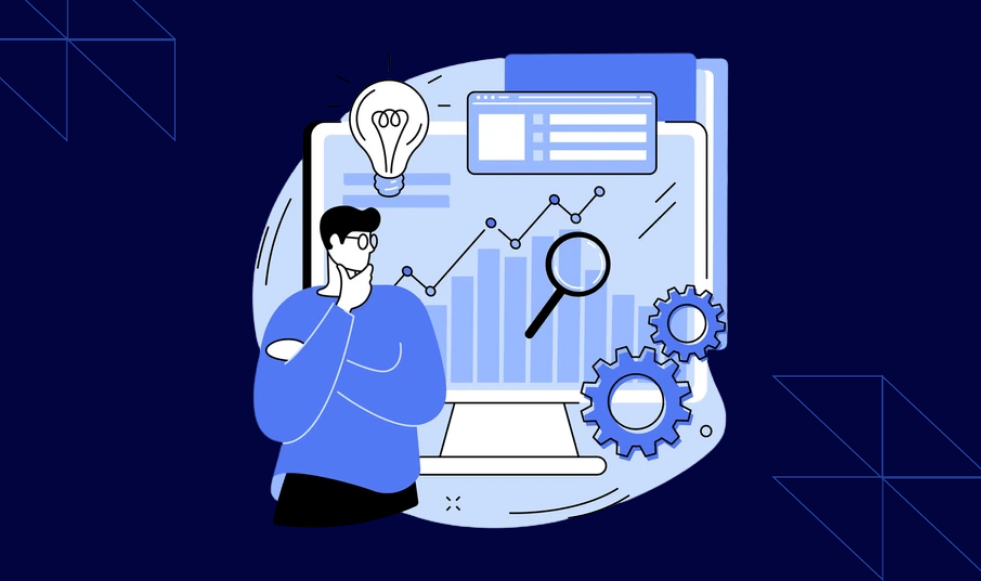
Artificial intelligence is a game-changer in almost every field. When it comes to business, AI plays a major role in offering personalized assistance to customers. It helps customers to locate brands and stores, answer common queries, and even send updates directly to them about a service or product. So, how is the personalized messaging support with AI a game-changer for business in 2025? Here are the benefits of personalized messaging support with AI.
-
Positive Customer Experiences:
Customized experiences that cater to the unique needs of each customer are more likely to cultivate robust, enduring relationships. The use of AI personalization can assist in establishing trust and dependability, thereby ensuring sustained success. By assisting customers with personalized messages, the business can get more positive responses than its competitors.
-
Increased Engagements and Conversion Rates
When you offer your customers relevant information, they are more likely to stay. This is where the AI takes a step. By understanding the Customer journey mapping, you can generate personalized support to increase engagement. When they are given what they prefer, their tendency to purchase from your brand increases.
-
Cost Effectiveness
With AI personalization, the operational cost is greatly reduced. The repetitive tasks and queries are handled by automation, which showcases a significant reduction in cost and thus improves the scalability.
-
Competitive Edge
By providing personalized messages, the customers feel like they are valued. This customized approach with the customers makes you stand out among the competitors.
-
Data-Driven Decisions
Do you know how personalization works? The Artificial Intelligence collects the data from customers for training. Using these data will help you make strategic decisions. You can go through the customer journey mapping and make decisions accordingly.
-
Targeted Segmentation
Do you know how to automate the data analysis process? This can be done with the right intervention of AI. This AI automation will take a deeper look into the patterns and segments, resulting in an increased ROI and tailored messages across different platforms.
-
Sentiment Analysis:
Guess What? AI can determine the mood of customers by analyzing customer reviews. Yes, the automation not only collects data by analysing the history, but it also determines the customer mood by going through the reviews and classifies whether it is positive or negative. This is implemented by the integration of Natural Language Processing and machine learning algorithms.
AI is transforming the way in which companies engage with their customers. By improving the customer experience and reducing operational costs, companies can rapidly evolve in the digital landscape.
What are the emerging trends in personalized messaging support with AI?
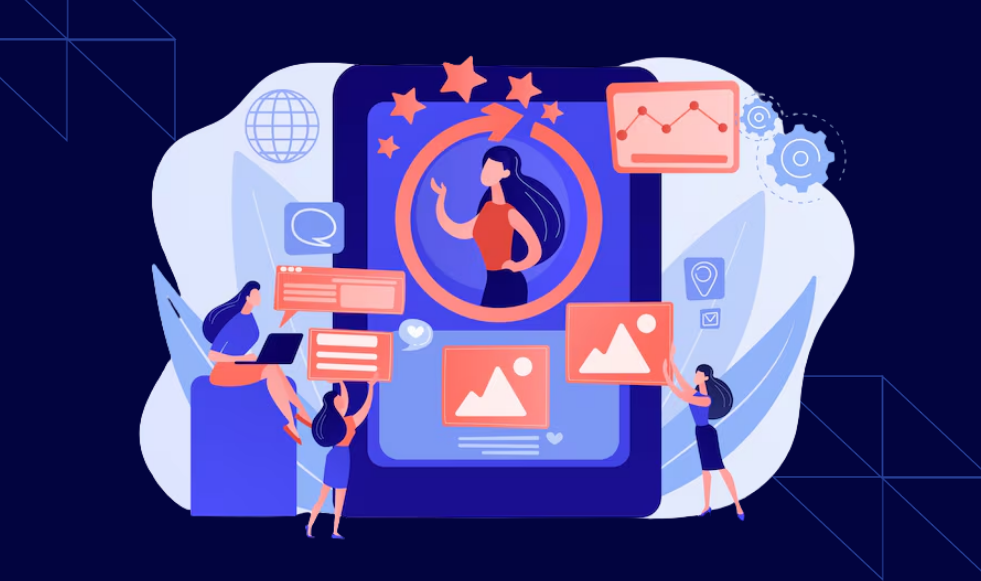
In the business world, AI-powered messaging plays a crucial role in increasing customer engagement. With the automation, the business can send personalized messages to customers depending on their preferences and history. So, what are the emerging trends in personalized messaging support with AI? Let us take a look at that.
-
Hyper Personalization
Hyper-personalization is a technique that uses Artificial Intelligence (AI), machine learning, and large volumes of real-time data to deliver personalized, sensitive customer experience, content, and promotions on every touchpoint along their path. Can you guess the major difference between traditional personalization and hyper-personalization? The traditional personalization collects the name, basic purchase history, and demographics of the customer, while the hyper-personalization takes a deeper turn. It analyzes the behavioural patterns and contextual data to create a personalized, individual experience.
-
Omnichannel Personalization
Omnichannel personalization is the process of taking the customer experience to the next level by delivering real-time messages to the customer across various channels, including mobile apps, websites, and other social media platforms, to enhance the overall customer engagement. The AI can integrate data from multiple channels to offer seamless customer experiences.
-
Generative AI for content creation
Generative AI plays a major role in customizing the messages across the channels, such as email, to let customers know about the business’s product recommendations.
What are the limitations and boundaries of AI personalized messages?

Though the AI personalization has many benefits, there are some limitations and boundaries with the AI personalized messages. Let us take a look at it.
- Lack of Human touch: One of the major limitations of sending AI personalized messages is the lack of human touch. These AI messages can sound polite, but they do not feel or have any emotions. These messages cannot convey joy, anger, or happiness. Instead, these AI chatbots offer basic responses. Businesses must build a balance between AI and human interactions.
- Job displacement and workforce impact: One of the major limitations of AI is the reduction in the need for some jobs. There is an alarming concern over the job losses. But in some cases, AI paves the way for jobs. It is important that the business trains its members to adapt to the AI workplaces.
- Ethical and Moral limitations: As we said earlier, AI lacks any emotions. It cannot understand human emotions, sarcasm, and cultural differences. There is also a high risk of ethical concerns. It can spread misinformation.
- Data Security Concerns: To provide personalized messages, AI collects the customer data, which raises security concerns. It is the responsibility of the business to protect the customer data. Regulations like GDPR ensure responsible AI use. Companies must follow strict data protection policies.
Final Thoughts
AI has changed the entire way in which businesses communicate. It has made the interactions faster, smarter, and even more personalized. The business benefited from the AI personalization. The AI personalization has become a breakthrough in the business world in 2025. Through the AI personalized messages, the businesses can improve customer satisfaction and build a healthy relationship with the customers. As the competition increases, it is essential to provide timely assistance to the customers with the right interactions.
Atidiv delivers seamless and consistent customer service across different channels by providing omnichannel support. We offer the customers personalized messages through email, social media platforms, webchat, and so on!
Frequently Asked Questions on AI Personalization
-
How can businesses use AI for personalization?
The business can use AI personalization to leverage customer data and provide tailored messages and thus enhancing the customer experience.
-
What are the challenges associated with AI personalization in 2025?
One of the major challenges associated with AI personalization is data security and privacy, high implementation rate, data quality issues, and so on.
-
What is the future of AI personalization?
AI personalization will deliver hyper-tailored experiences using real-time data, predictive models, and ethical AI practices, transforming industries like e-commerce, healthcare, and education.
